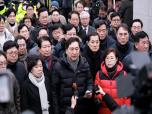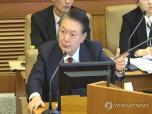무디스 "강만수 때문에 한국 금융상황 악화"
"한국 은행들의 외화 유동성 부족 충분히 해결 가능"
무디스이코노미닷컴은 이날 발표한 보고서 <한국에서 커지는 은행 스트레스>를 통해 한국 은행들이 직면한 과도한 가계부채 및 부실자산 증가 가능성을 위험성을 직면하면서도 “한국 정부는 방대한 규모의 외환보 유액을 보유하고 있다”며 “한국에서 1997년에 발생한 외환위기가 재발할 수 있다는 우려는 과장됐다”며 제2 외환위기 발발 가능성을 일축했다.
무디스이코노미닷컴은 그러나 “지금 투자가들은 극도로 예민해 정부가 금융위기를 잠재우기 위해 내놓는 말이나 행동이 오히려 정반대의 효과를 가져올 수 있다”며 “이번 주 초 강만수 기획재정부 장관이 ‘국내 은행들이 외화유동성 부족 상황에 직면해 있다’고 발언하자 은행주가 폭락한 것처럼 실제 상황을 더 악화시킬 수 있는 부정적인 발언은 자제해야 한다”고 지적했다.
국제신용평가기관으로부터도 질타를 받을 정도로 강 장관의 국내외 신뢰도는 급락한 모양새다.
다음은 무디스가 이날 발표한 보고서 원문 전문.
Moody's, "Banking Stress Growing in South Korea"
Hong Kong, 2008-10-08 (Korea Newswire) -- Problems in global credit markets come at a particularly bad time for Korea. Its balance of payments has deteriorated markedly; South Korea will post a current account deficit this year, the first since the 1997 Asian financial crisis. The deterioration occurred for a number of reasons. Although exports are strong—growing 28.7% y/y in September—imports are soaring, rising 45.8% that month. This is mainly due to the high price of oil. Slowing domestic growth prospects are also causing foreign investors to repatriate capital and has weakened the currency, pushing up the cost of imports.
Net savings among households and businesses are low, and private sector debt is 180% of GDP. The government’s provision of $5 billion to Export-Import Bank of Korea, a state owned bank, to ease funding constraints among exporters, was a reminder that many other banks may face a rise in non-performing loans because of slowing exports and growth.
Investors are nervous. Government words and action, in an attempt to calm financial markets, have lately had the opposite effect, and may risk creating a self-fulfilling downward cycle. Finance minister Kang Man-soo earlier this week declared local banks face foreign currency liquidity shortages. Bank stocks plummeted. The remarks were clarified by a vice finance minister—banks will not face a liquidity problem ‘until year end’. Twelve-month Koribor is now at the highest since it started being recorded in 2004. The won was sold off, dropping 15% against the dollar from the beginning of the week.
Fears of a wide-ranging crisis, on the scale of the 1997 Asian financial crisis, are however overblown. South Korea has vast foreign reserves, which the government will use to ease foreign currency liquidity constraints among banks. Although they have intervened at times to prop up the won, the government appears resigned to letting the won reflect its fundamental value and watching it tumble. Falling oil prices will ease the import burden, while a weak currency will make exports more competitive.
Alaistair Chan is an Associate Economist based in the Sydney office. Alaistair received his Honours degree in Economics at The University of Western Australia.
<저작권자ⓒ뷰스앤뉴스. 무단전재-재배포금지>








